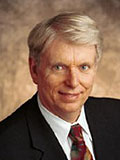|
|
|
<<< Previous speaker
|
next speaker >>>
|
CEO Jeff Sutherland, Scrum Inc.

Dr. Sutherland started his career as a fighter pilot in the U.S. Air Force. His last two tours of duty were at Stanford University where he received a M.S. in Statistics and the United States Air Force Academy where he taught Mathematics, Statistics, and Probability. In 1975 he joined the faculty of the University of Colorado Medical School where he received a Ph.D.. As Asst. Prof. of Radiology, Biometrics, and Preventive Medicine he co-founded the Center for Vitamins and Cancer Research under the sponsorship of Nobel Laureate Linus Pauling and for eight years was the Principle Investigator of a multimillion dollar National Cancer Center research grant that ran all IT programs for the Colorado Regional Cancer Center. This included data collection on all cancer patients in Colorado and integration with a national registry, as well as clinical trials, epidemiological studies, and research on supercomputer mathematical models of carcinogenesis.
In 1983 he joined a banking company that serviced 150 banks throughout North America where he was VP of Advanced Systems and General Manager of their ATM business unit. He has been VP of Engineering and CTO of nine software companies. In the first four companies he prototyped Scrum and in the fifth company created Scrum as we know it today. His last four companies have been totally Scrum where teams have consistently demonstrated hyperproductivity. In 2001 he was a Signatory of the Agile Manifesto. His last company, PatientKeeper, performs at 10 times the speed of their outsourcing partner and is the first company to use Scrum to achieve a hyperproductive revenue state, quadrupling their revenue in 2007.
Jeff is currently the Chairman of the Scrum Training Institute, CEO of Scrum, Inc., and Senior Advisor to OpenView Venture Partners where he is Agile Coach for the venture group and their 20 portfolio companies.
|
Presentation: "Fully Distributed Scrum: The Secret Sauce for Hyperproductive Outsourced Development Teams"
Time:
Wednesday 14:40 - 15:30
Location:
Kammermusik
Abstract: Scrum was designed to achieve a hyperproductive state where productivity increases by 5-10 times over industry averages and many collocated teams have achieved this effect. The question for this talk is whether distributed, outsourced teams can consistently achieve the hyperproductive state. In particular, can a team establish a localized velocity and then maintain or increase that velocity when distributing teams across continents.
In 2006, Xebia (Netherlands) started localized projects with half Dutch and half Indian team members. After establishing a localized velocity of 5 times their waterfall competitors on the same project, they moved the Indian members of the team to India and showed increasing velocity with fully distributed teams. Running XP engineering practices inside many distributed Scrum projects, Xebia has systematically productized a model very similar to the SirsiDynix model for high performance, distributed, outsourced teams with outstanding high quality. The fully distributed model is now the recommended standard for high performance distributed Scrum when organizations can pass the "Nokia test for Scrum implementation" and fully implement XP engineering practices in their Scrum teams.
There is a full length paper that will be avalable at the session and presentation and discussion will address the following key points:
-Outsourcing Models
-Strengthening the distributed team model
-Process over culture
-Soft factors
Workshop: "Certified Scrum Master Class - Jeff Sutherland"
Time:
Thursday 09:00 - Friday 17:00
Location:
SAS - Suecia
Abstract:
Since 1993 Scrum has been implemented with great success in severalthousands of projects all over the world. Companies like Microsoft, HP,IBM, Yahoo, Xerox, Primavera, CapitalOne, Federal Reserve Bank and BBChave already adopted Scrum as one of the primary tools for efficiencyimprovements.Today, there are more than 3000 certified ScrumMasters in the US,Europe and in India.
The agile methodology Scrum supports the philosophy behind LeanThinking and Lean Software Development. A very important dimension inScrum is to secure a great level of motivation and commitment betweenthe involved employees and to focus on the management aspects inproject organisations.
Scrum - like Lean - has originated from the Toyota factories'processes of efficiency improvements in the production environment. Thegodfathers of Scrum are Hirotaka Takeuchi and Ikujiro Nonaka.
Attending this tutorial you'll be a certified ScrumMaster.
Attendance conditions:
- you should have read one of the Scrum books
- basic understanding of project management
- formerly involvement in projects that develops or prepares services or products
- the desire to learn more about scrum; how you use it and how it's implemented in an organisation
- for all people with the above mentioned experiences - not only for experts
|
 |
| |



